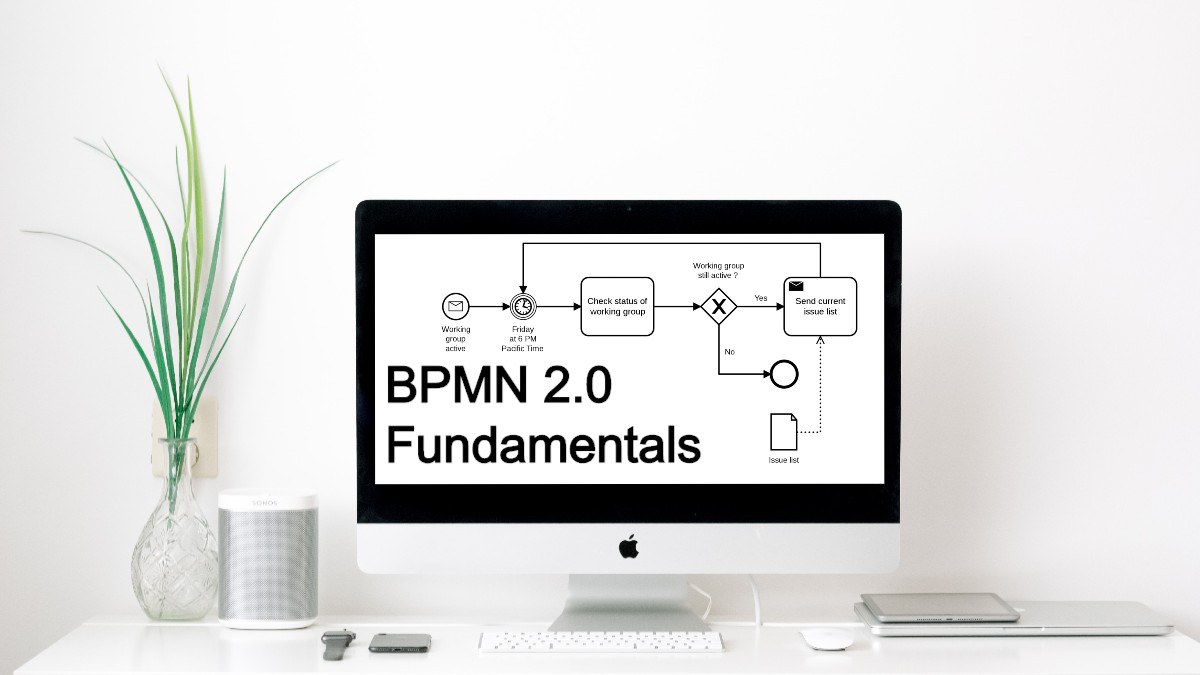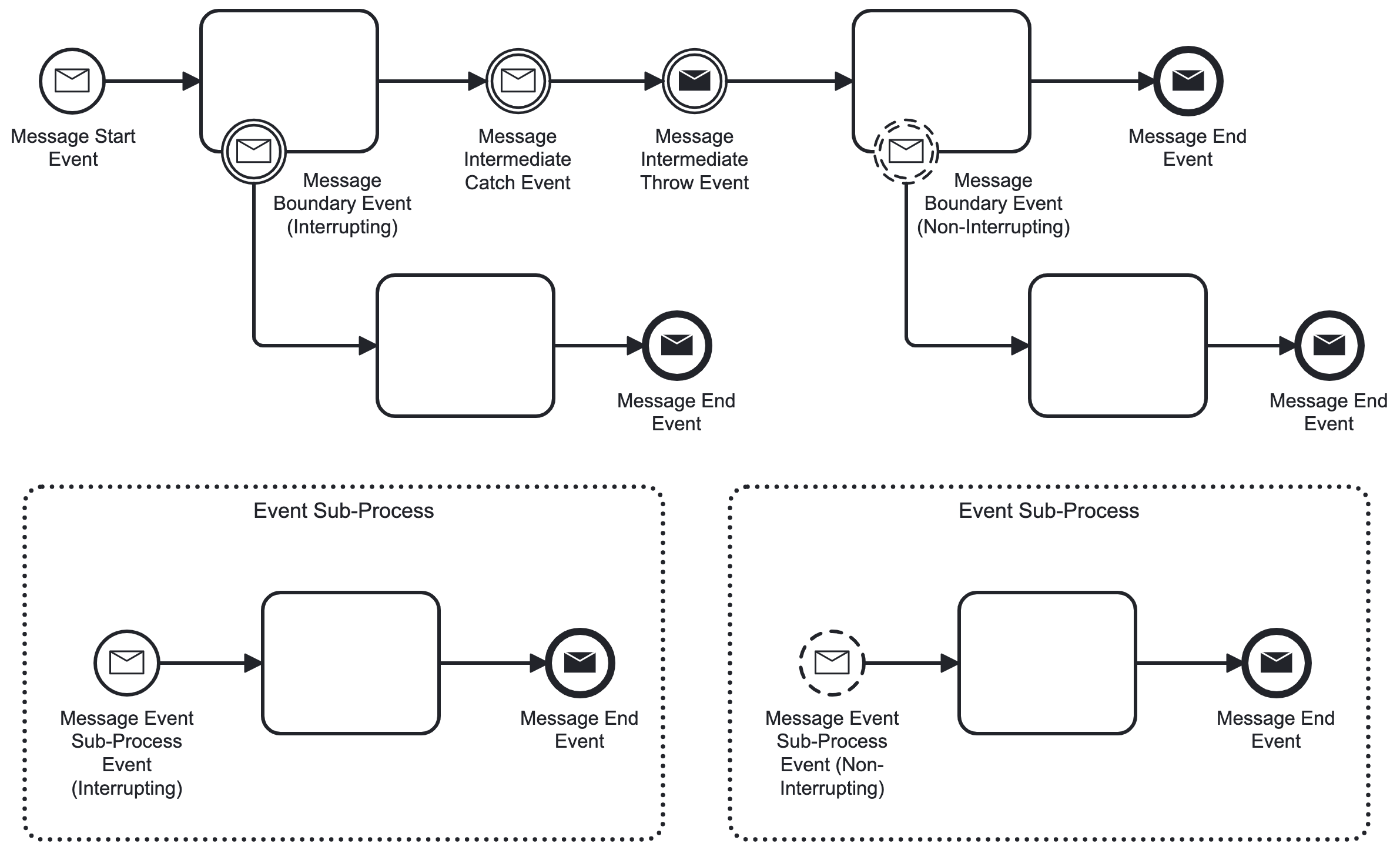BPMN Message Event

The BPMN Message Event article provides a detailed explanation of the message event BPMN element, including the definition, notation, rules, guidelines and examples.
- BPMN Definition
- BPMN Notation
- BPMN Event Types
- BPMN Blueprint Diagram
- BPMN Standards
- BPMN Guidelines
- Conclusion
- Reference
The BPMN Message Event article delves deep into the intricacies and applications of the message event element as outlined in the BPMN 2.0 specification. The definition, notation, and rules sections offer a concise summary of the BPMN 2.0 Specification pertaining to the message event element. Meanwhile, the guidelines section presents a curated collection of best practices specific to the message event, showcasing its proper and effective utilisation in process modelling.
BPMN Definition
A BPMN Event that references a named message is known as a Message Event. A Message represents the content of a communication between two Participants. ~ BPMN Specification
Message events are used to send and receive messages between two distinct processes. Message Events may be used as a mechanism for two processes to communicate.
BPMN Notation
The BPMN specification defines the different types of Message Event elements using the following description and notation:
| Element | Description | Notation |
|---|---|---|
| Message Start Event | A Message arrives from a Participant and triggers the start of the Process. | |
| Message Event Sub-Process Event (Interrupting) | A Message Event can also initiate an inline Event Sub-Process. A Message Event Sub-Process that interrupts its containing Process is known as a Message Event Sub-Process Event (Interrupting). | |
| Message Event Sub-process Event (Non-Interrupting) | A Message Event can also initiate an inline Event Sub-Process. A Message Event Sub-Process that does not interrupt its containing Process is known as a Message Event Sub-Process Event (Non-Interrupting). | |
| Message Intermediate Catch Event | A Message Intermediate Catch Event can be used to receive a Message. | |
| Message Boundary Event (Interrupting) | A boundary event is an event that is attached to the boundary of an activity. A Message arrives from a participant and triggers the Event. A Message Boundary Event (Interrupting) is attached to an activity and will interrupt the activity. | |
| Message Boundary Event (Non-Interrupting) | A boundary event is an event that is attached to the boundary of an activity. A Message arrives from a participant and triggers the Event. A Message Boundary Event (Non-Interrupting) is attached to an activity and will not interrupt the activity. | |
| Message Intermediate Throw Event | A Message Intermediate Throw Event can be used to send a Message. | |
| Message End Event | A Message End Event can be used to send a Message once the token reach the end event and then terminate the process. |
BPMN Event Types: Message Events
BPMN Event Types
BPMN events represent various types of occurrences that affect the flow of a process, and they can be categorized based on their position and behavior in the process.
- Start Event: The Start Event indicates where a particular Process will start.
- Intermediate Event: The Intermediate Event indicates where something happens (an Event) somewhere between the start and end of a Process.
- End Event: The End Event indicates where a Process will end.
- Catching Events: Events that catch a trigger. All Start Events and some Intermediate Events are catching Events.
- Throwing Events: Events that throw a Result. All End Events and some Intermediate Events are throwing Events that MAY eventually be caught by another Event.
- Boundary Event: An Intermediate Event that is attached to the boundary of an Activity.
The following table illustrates how the different types of Message Events are grouped as per the BPMN Event types:
| Catching Events | Throwing Events | |||||||
| Start Event | Intermediate Event | End Event | ||||||
| Standard | Event Sub-Process Interrupting | Event Sub-Process Non-Interrupting | Catching | Boundary Interrupting | Boundary Non- Interrupting | Throwing | Standard | |
| Message Event | ||||||||
BPMN Notation: Message Event
BPMN Blueprint Diagram
The BPMN Blueprint Diagram provides a comprehensive visual representation of all the different types of BPMN Message Events.
 Example of BPMN Message Event
Example of BPMN Message Event
BPMN Standards
A standard is a level of quality or attainment that holds high authority and must be adhered to. The following is a list of standards that are applicable to the BPMN Message Event as per the official BPMN Specification.
- A Message Intermediate Event MAY be the target for a Message Flow; it can have one incoming Message Flow.
- A Message Intermediate Event MAY be a source for a Message Flow; it can have one outgoing Message Flow.
- A Message Intermediate Event MAY have an incoming Message Flow or an outgoing Message Flow, but not both.
BPMN Guidelines
A guideline is a non-specific rule or principle that provides direction to action or behaviour, holding low authority and assisting in setting standards or determining a course of action. The following is a list of guidelines that are applicable to the BPMN Message Event as per the official BPMN Specification.
- A Message Start Event should have a Text Annotation with text “Receive Message - [Message Name]”.
Conclusion
In conclusion, understanding the BPMN Message Event is pivotal for anyone aiming to master process modeling as per the BPMN 2.0 specification. This article has provided a thorough exploration of the message event element, from its foundational definitions to its nuanced applications. By adhering to the guidelines and best practices presented, professionals can ensure that they harness the full potential of the message event, leading to clearer, more effective, and standardized process models.
Whether you’re a novice or an expert, revisiting the principles and practices surrounding the BPMN Message Event can only enhance your modeling prowess.
Reference
- Business Process Model and Notation Specification Version 2.0.2. (2014, January). https://www.omg.org/spec/BPMN/2.0.2/
